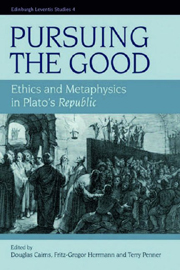Book contents
- Frontmatter
- Contents
- Preface
- Contributors and Editors
- Introduction
- 1 What is the Form of the Good the Form of? A Question about the Plot of the Republic
- 2 Glaucon's Challenge, Rational Egoism and Ordinary Morality
- 3 Thrasymachean Rulers, Altruistic Rulers and Socratic Rulers
- 4 Neutralism in Book I of the Republic
- 5 The Good, Advantage, Happiness and the Form of the Good: How Continuous with Socratic Ethics is Platonic Ethics?
- 6 The Form of the Good and the Good in Plato's Republic
- 7 Flourishing: The Central Concept of Practical Thought
- 8 Is Plato's Conception of the Form of the Good Contradictory?
- 9 The Good, Essences and Relations
- 10 The Idea of the Good and the Other Forms in Plato's Republic
- 11 The Aporia in the Charmides about Reflexive Knowledge and the Contribution to its Solution in the Sun Analogy of the Republic
- 12 The Good and Mathematics
- 13 The Good and Order: Does the Republic Display an Analogy Between a Science of Ethics and Mathematics?
- 14 Inquiry and Justification in the Search for the Highest Good in Plato and Aristotle
- 15 The Carpenter and the Good
- 16 Conversion or Conversation? A Note on Plato's Philosophical Methods
- Index
7 - Flourishing: The Central Concept of Practical Thought
Published online by Cambridge University Press: 12 September 2012
- Frontmatter
- Contents
- Preface
- Contributors and Editors
- Introduction
- 1 What is the Form of the Good the Form of? A Question about the Plot of the Republic
- 2 Glaucon's Challenge, Rational Egoism and Ordinary Morality
- 3 Thrasymachean Rulers, Altruistic Rulers and Socratic Rulers
- 4 Neutralism in Book I of the Republic
- 5 The Good, Advantage, Happiness and the Form of the Good: How Continuous with Socratic Ethics is Platonic Ethics?
- 6 The Form of the Good and the Good in Plato's Republic
- 7 Flourishing: The Central Concept of Practical Thought
- 8 Is Plato's Conception of the Form of the Good Contradictory?
- 9 The Good, Essences and Relations
- 10 The Idea of the Good and the Other Forms in Plato's Republic
- 11 The Aporia in the Charmides about Reflexive Knowledge and the Contribution to its Solution in the Sun Analogy of the Republic
- 12 The Good and Mathematics
- 13 The Good and Order: Does the Republic Display an Analogy Between a Science of Ethics and Mathematics?
- 14 Inquiry and Justification in the Search for the Highest Good in Plato and Aristotle
- 15 The Carpenter and the Good
- 16 Conversion or Conversation? A Note on Plato's Philosophical Methods
- Index
Summary
To Plato we are indebted for the hypothesis, breathtaking in its boldness, that the highest object of desire, study and action is the good. In one form or another, that suggestion was accepted by many of his successors in the ancient and medieval world. Aquinas, for example, is following in his footsteps, when he says: ‘this is the first precept of law, that good is to be done and pursued, and evil is to be avoided. All other precepts of the natural law are based on this’ (Summa Theologica, Pt. I–II, Q. 94, Art. 2). The practical pre-eminence of good is not a notion that evaporated in the modern era; on the contrary, it lies at the heart of utilitarianism. However, a second cardinal doctrine of utilitarianism, namely that good can be quantified and must be increased without limit, does not play an important role in Plato or in pre-modern ethics, although we find something resembling that idea in the Protagoras. In the Philebus, however, Plato instead emphasizes the affinity between goodness and limit, form, structure, measure and other such notions. Whatever is good – knowledge and pleasure, for example – is good only up to a certain point, and no more. A good life for an individual requires some proportionality or mixture, and likewise what is good for the political community. Many modern philosophers, by contrast, suppose that rationality itself requires maximizing something; according to their way of thinking, the only appropriate stance to take towards what is good is to produce as much of it as possible.
- Type
- Chapter
- Information
- Pursuing the GoodEthics and Metaphysics in Plato's Republic, pp. 154 - 167Publisher: Edinburgh University PressPrint publication year: 2007



